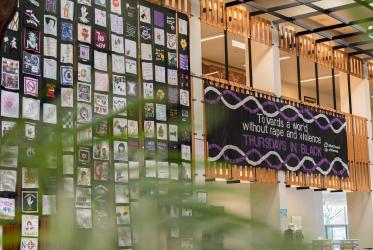I will never forget receiving a phone call at work one day saying, “do you know your partner is HIV+?” Even though I had to wait two weeks for blood results in those years, I somehow just knew. I wasn’t just hit by a train; the train never left. I thought I was going to be dead before I was 30.
I was a rebellious teenager, not really an uncommon thing, but in that stage, you really fight for things you feel strongly about without the insight into the impact it has on others. When I tested HIV+, and with the discrimination of the early era, for the first time, I was scared of how something in my life would impact my father’s position as a reverend. It took several months before I told them – I couldn’t hide it for too long with my pregnancy. My dad’s first response was, “come home, my child, we will deal with this together.” My mom cried a lot, “what did she do to deserve this?” (Mothers are like that.) The church’s response was, unfortunately, initially disappointing: I was told that I was the one who sinned and should go to them for help – it wasn’t their job to come to me to guide me.
The biggest help at the time was a great counsellor and support group. Meeting other people who had been surviving without medication was a great help in my journey of acceptance and forgiveness. This also led me to become an active speaker about living with HIV. I focused particularly on speaking in churches and focused on how judgement impacts the lives of people going through many issues, not just HIV.
I later found that not all churches are equally judgmental. In fact, once I started to speak out, I found that more people were supportive than stigmatizing. It made openly living with HIV so much easier.
Living with HIV is not linear; you do not just deal with the virus – you still have to deal with everyday life and, to top that, with prejudice, stigma, discrimination, and judgement.
- Pregnancy and motherhood
Experiencing pregnancy and motherhood was the most fulfilling time of my life. There was no medication to prevent mother-to-child transmission at the time, and Calvin was born HIV+. In fact, we had no medication at all at that time. Calvin was quite sickly during his first two years of life, and then we had 5 more years of a really good life.
Unfortunately, when he was seven years and six months old, he suddenly got ill with viral pneumonia and passed away. The devastation of learning I was HIV+ at 22 did not prepare me for the devastation I experienced losing my son – it was truly the worst time of my life.
- Health and access to treatment
I lived with HIV for ten years before being part of a drug trial that gave me access to treatment. My own health was up and down at this stage but soon improved with the medication. Dealing with the side effects of the early medications was quite hard initially, but the improved wellness and a generally positive outlook on life got me back on the life track fairly soon. I moved to Cape Town after Calvin’s passing, and the quality of life here suited me well.
- Relationships
Calvin’s father was my first real love, but I soon realized he was a womanizer. He also infected three other women and fathered two more children. He was taken to court for deliberately infecting someone, but he passed away before the end of the proceedings.
My second relationship was with an HIV+ man who couldn’t deal with my public status. I became an HIV activist shortly after being infected. The relationship took place in secret for a few short years only.
The last relationship I got into was just before being diagnosed with Major Depressive Disorder, and a complete mistake. He was an emotionally abusive alcoholic. It was an important lesson, though, because this is the reality of what women experience- and why gender-based violence is such a huge threat in life.
- Menopause and Aging
I started experiencing menopause symptoms around the age of 42. Early menopause is apparently not uncommon for women living with HIV and on treatment. Unfortunately, it took me several years to convince a doctor of this. I have since experienced two small strokes as part of the menopause period and recently have been diagnosed with HPV cancer that is in remission after treatment.
Living with HIV has been hard and not hard, depending on during what stage of life you ask me – you try and live life as normal and healthy as possible, but you always know it is there in the back of your mind. And someone will remind you if you think that you may forget!
The COVID-19 pandemic seems to have taken some of the attention away from what is happening with HIV, which means that numbers are slowly rising again. With the amazing treatments available, I can definitely see the potential for ending new infections, but we need to get people on board, and that might take time.
I have always believed in HOPE.
I believe that my hope through all the years stems from a strong sense of faith and growing up in the church. Knowing that there is more to life, knowing that there is a God greater than anything this life has to offer, has given me a sense of stability like the Biblical house built on rock instead of sand. I mostly found my hope in the Bible instead of in churches. Yes, churches play an important role, but please know that the true message is still in the Bible.
I have always believed in HOPE and still do. I will never give up. I really hope you won’t, either.









